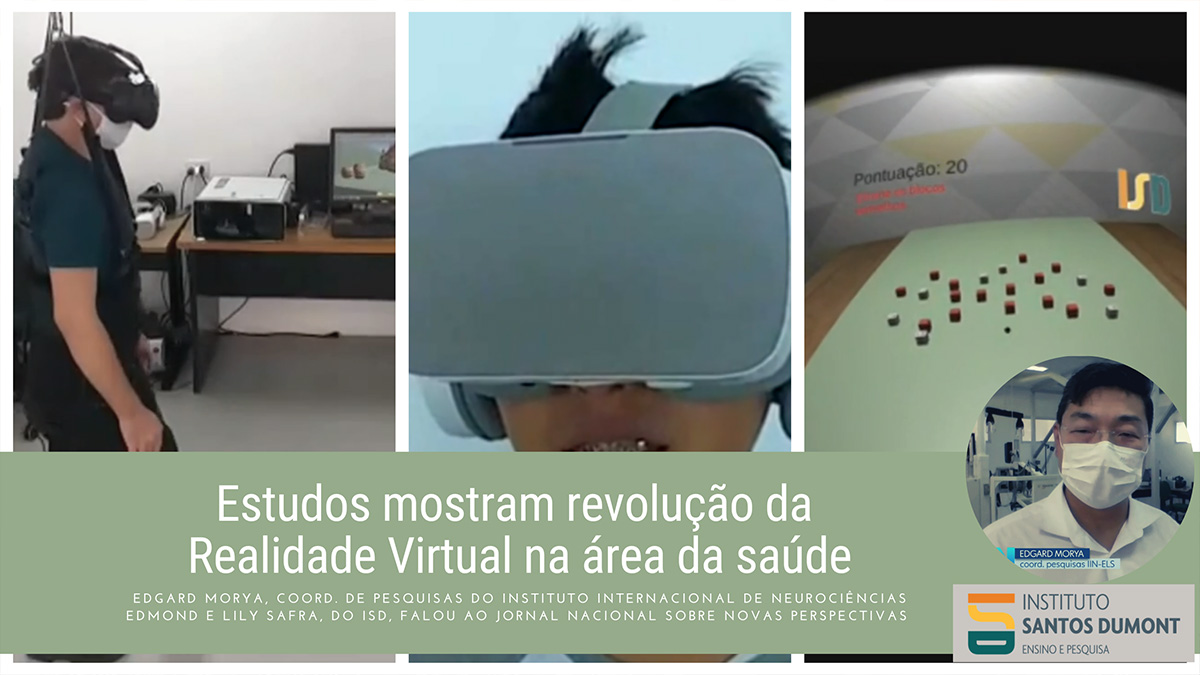Research from the Edmond and Lily Safra International Institute of Neuroscience (IIN-ELS), from the Santos Dumont Institute (ISD), shows the potential revolution of “Virtual Reality” (VR) for the healthcare area.
In environments created on a computer and with the aid of glasses that allow the simulation of real experiences, the technology opens up, according to the researchers, new perspectives for the rehabilitation of people who have lost movement, for adapted sports training and for reducing pain, for example. example, during vaccine applications.
The research is carried out by students from master's degree in neuroengineering from the Institute – the only one in Brazil in this area – and were highlighted in a report by Jornal Nacional, on TV Globo, this Tuesday (14). Click here to access text and video on the newspaper's website.
“With virtual reality, we no longer need the patient to come to the location. He can do this remotely and you can monitor, record all the information and change his treatment too”, said IIN-ELS research coordinator Edgard Morya in the interview.
THERAPIES
The use of virtual reality glasses allows the user to experience the sensation of walking through certain environments, being in a crowded elevator or immersed, for example, within a game.
The Jornal Nacional report showed an international experiment using technology to reduce the stress caused by the pandemic and, in the context of how VR has already been used, showed details of work by Brazilian researchers to treat patients with anxiety in closed environments, attention deficit disorder and – in the case of IIN-ELS – with paralysis in the lower limbs or fear of taking an injection.

The Institute's research cited in the report is conducted by master's student and biomedical engineer João Paulo Bezerra Fernandes, under the guidance of Morya. Another front they are focusing on is the development of a bocce game to make it easier for people in wheelchairs to practice the sport.
“As many para-athletes have difficulty getting to a training location, we created the game in virtual reality so they can train anywhere. The difference is that in addition to being in VR, the game also records the athlete's arm movements, so the coach can monitor the training and improve”, explains the student.
INNOVATION
Other studies underway at ISD serve as a stimulus for innovation in treatments and, also, for entrepreneurship.
Biomedical scientists Tâmara and Tássia Nunes, twin sisters from Sergipe and postgraduate students, help illustrate this story.

Future neuroengineers test the use of virtual reality and augmented reality for rehabilitation.
“By combining brain-machine interface and virtual and augmented reality technologies, we can help improve the quality of life of these patients,” said Tássia in an interview with @isdnarede, the profile of the Santos Dumont Institute on social media.
“The expectation is that they will be able to control, with their brain, a virtual environment, an avatar and, through this, stimulate neuroplasticity, that is, neuronal modifications that can recover or improve functions”, he explains.
Based on the studies they carry out, the twins created the startup EducAR, which focuses on education using this type of technology. The startup was developed in partnership with former IIN-ELS/ISD student – now a master in neuroengineering – Mab Nunes.
In six months of existence, it was approved in the Federal Government's Centelha program to operate in the state of Sergipe. It was also approved for incubation at the Tiradentes Innovation Center, at Tiradentes University. And the future, says Tássia, is well defined.
“We have to complete our master’s degree next year. Afterwards, we want to continue working with the development of virtual reality, augmented reality and brain machine interface technologies – and take these technologies to the market through entrepreneurship”.
Text: Renata Moura/ Journalist / Ascom – ISD
Video: TV Globo
Communication Office
comunicacao@isd.org.br
(84) 99416-1880
Santos Dumont Institute (ISD)
It is a Social Organization linked to the Ministry of Education (MEC) and includes the Edmond and Lily Safra International Institute of Neurosciences and the Anita Garibaldi Health Education and Research Center, both in Macaíba. ISD's mission is to promote education for life, forming citizens through integrated teaching, research and extension actions, in addition to contributing to a fairer and more humane transformation of Brazilian social reality.















